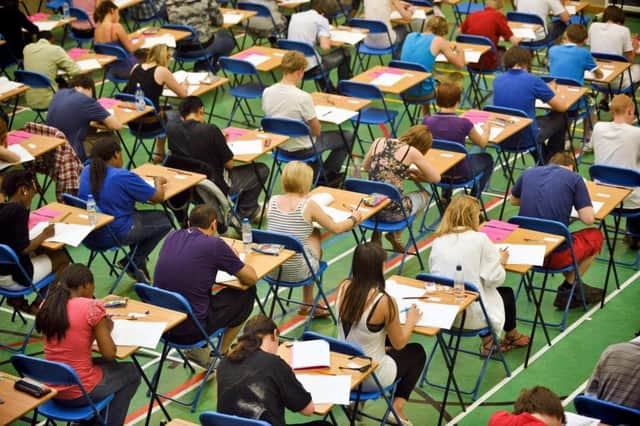Record drop in GCSE results but girls continue to outperform boys


In total, just over two-thirds of entries in England, Wales and Northern Ireland (66.9 per cent) were awarded A*-C - deemed by schools to be a “good” pass. However, this was a 2.1 percentage point drop on the previous year, representing the biggest 12-month dip since the creation of the GCSE format in 1988.
The overall pass rate - those achieving A*-G - also dropped, albeit it only slightly, from 98.6 per cent in 2015 to 98.4 per cent this year.
Advertisement
Hide AdAdvertisement
Hide AdThe figures, published by the Joint Council for Qualifications (JCQ), show that the gender gap increased by 0.5 per cent this summer, with 71.3 per cent of girls’ entries awarded at least a C grade, compared with 62.4 per cent of boys’. However, both were down on last year, from 73.1 per cent and 64.7 per cent respectively.
Girls are ahead of boys across all subjects at A*-C by 8.9 percentage points - the highest since 2002.
Thursday’s results include vast swathes of students resitting English and maths - stipulations brought in under the coalition government to ensure teenagers in England who do not score at least a C grade in both subjects at the age of 16 are required to continue studying these subjects until they reach this level.
Professor Alan Smithers, director of the University of Buckingham’s Centre for Education and Employment Research, said the drop in A*-C grades was the biggest since the creation of GCSEs in 1988 - and was unexpected.
Advertisement
Hide AdAdvertisement
Hide AdHe said: “A*-C grades rose continuously from 1988 to 2011; since then the major fall has been from 2012 to 2013, down 1.3 percentage points from 69.8 to 68.1.
“The fall this year is larger than might have been expected.
“There was the increase of 34 per cent in those having to take English and maths again because they fell below a C grade first time, and the standards were held high.
“But I suspect it may also have something to do with this being the last year of the existing maths and English syllabuses, and some schools concentrating on the new syllabuses which they are already teaching for next year’s exams.”
Advertisement
Hide AdAdvertisement
Hide AdThis is the last year in which GCSE results are scored with grades A* to G.
From next summer, pupils will take reformed courses in English language, English literature and maths, marked with numbers from 9 for the top-performing students down to 1 for those who have struggled. The changes will be rolled out across another 17 subjects by summer 2018.
Results showed a 23.2 per cent increase in the number of students aged 17 and over - the vast majority of which are expected to be those resitting exams - although their grades at A*-C dropped by 7.6 percentage points.
Malcolm Trobe, interim general secretary of the Association of School and College Leaders (ASCL), said analysis of previous data showed that youngsters resitting GCSEs a year later only improve by half a grade - while a “significant” number actually achieve a lower score.
Advertisement
Hide AdAdvertisement
Hide AdHe said: “Those youngsters getting a middling D have a fighting chance of increasing that to a C.
“Those getting an E or below, the pattern over the years is that they might improve a grade, but they won’t improve it to a C.
“You’ve only ever been on around one-third getting up to a grade C, and that’s dropped to 29 per cent in maths and 27 per cent in English.
“I think it does raise the question - is the GCSE resit the most appropriate programme for all? It is certainly the most appropriate step for a number.”
Advertisement
Hide AdAdvertisement
Hide AdThe statistics also show a 76.4 per cent rise in entries for computing (up to 62,454 candidates from 35,414 last year), while engineering (11.7 per cent rise) and additional science (up 10.5 per cent) also increased in popularity.
There were significant drops in the numbers of students taking the humanities GCSE (down 37.4 per cent), while statistics (minus 30.7 per cent) and additional science (further) (minus 25.6 per cent) also suffered losses, although all three subjects typically had less than 100,000 students nationally, compared with design and technology GCSE, which had 185,279 students this year (a drop of 9.5 per cent).
Entries for French and German were down.
A total of 5,434,597 GCSE results have been issued today, up on last year’s 5,429,478 - although there was a 70,000 increase in resitting students, around 52 per cent of which are girls, down from 54% the previous year.
Andrew Hall, chief executive of exam board AQA, said the jump in students taking computing is “really encouraging”.
Advertisement
Hide AdAdvertisement
Hide AdHowever the drop in students taking creative subjects such as music, drama and art “from a position of stability” is stark, said Mr Hall.
Entries for media/film/TV studies fell by 11.6 per cent, while performing/expressive arts declined by 9.4 per cent.
The results showed increases in entries for both combined sciences (up 3.3 per cent) and separate biology, chemistry and physics courses (up 3.6 per cent 5.57 per cent and 4.6 per cent respectively).
He said overall the results across all GCSE subjects demonstrated “real stability”.
Advertisement
Hide AdAdvertisement
Hide AdHe said: “Not surprisingly, the 17-year-old entries are massively up by 23.2 per cent - absolutely dominated by resitting English and maths in England.
“We are getting much, much more of a focus here on 16 and 17-year-olds resitting.”
Schools minister Nick Gibb said: “I am pleased to see that there are more GCSEs being taken in the core academic subjects, those that give students a wider range of opportunities.
“And for those 17-year-olds who have struggled to achieve good grades in maths, we are seeing 4,000 more successful retakes of those exams; delivering better prospects for every one of those young people.”